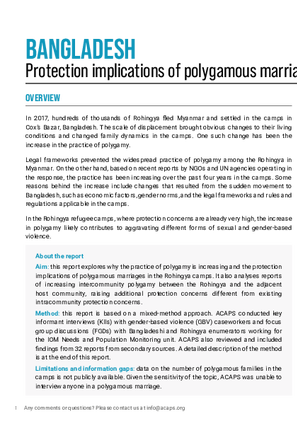-
Countries
-
Data and Analysis
-
Special Focus
-
Crisis Responses
Bangladesh — NPM ACAPS Analysis Hub Report — Protection implications of polygamous marriages in the Rohingya camps (January 2018 - December 2022)

Contact
NPM Bangladesh, NPMBangladesh@iom,int
Language
English
Location
Bangladesh
Period Covered
Jan 01 2018
Dec 31 2022
Activity
- Other
- Survey
- Community Perception
In 2017, hundreds of thousands of Rohingya fled Myanmar and settled in the camps in Cox’s Bazar, Bangladesh. The scale of displacement brought obvious changes to their living conditions and changed family dynamics in the camps. One such change has been the increase in the practice of polygamy.
Legal frameworks prevented the widespread practice of polygamy among the Rohingya in Myanmar. On the other hand, based on recent reports by NGOs and UN agencies operating in the response, the practice has been increasing over the past four years in the camps. Some reasons behind the increase include changes that resulted from the sudden movement to Bangladesh, such as economic factors, gender norms, and the legal frameworks and rules and regulations applicable in the camps.
In the Rohingya refugee camps, where protection concerns are already very high, the increase in polygamy likely contributes to aggravating different forms of sexual and gender-based violence.
